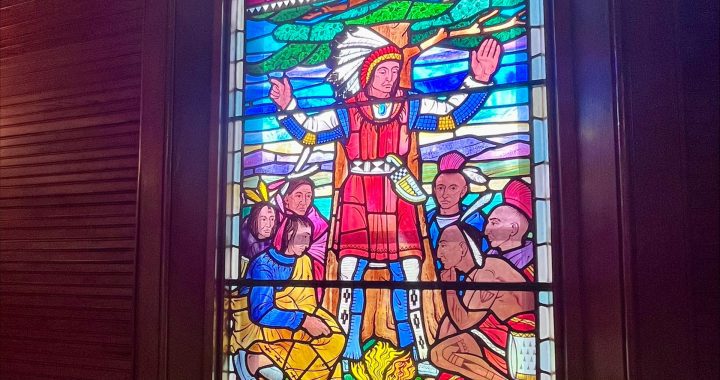By Kathleen Martens
APTN Investigates
WINNIPEG – There is talk amongst former Indian residential school students that the personal education credit available to them is another form of colonial control.
Oct. 31, the deadline for applying for the credit, is coming up quickly.
But anger is starting to build over the $3,000 credits that can only be applied to approved-cultural and/or –educational programs.
“They are grinding sand into our pain and thinking nothing of it,” said Margery Loverin. “… I feel that they [are] dangling the [dollars] and showing us that they can still hurt us again and again, and there’s nothing we can do about it.”
Loverin is one of several former students, who wish to be known as survivors, that are openly criticizing the credits. They are pouring their anger into a newly organized petition demanding cash instead of credit, to spend where they choose.
“We have 198 signatures so far,” Betsy Bruyere said about the online petition featured on her survivor Facebook page.
Bruyere says survivors are reporting problems when they try to use the credits at universities in British Columbia and Manitoba.
“It makes me mad, [to be] used and abused by a government,” wrote Gil McGillivary online, “just to get a piece … of FUNNY MONEY going to an educational system that also doesn’t have a clue what they are supposed to do with this CREDIT VOUCHER.”
“[It] reminds me of the old days of watching my grandparents going to the band office to get a monthly government ration for us to supply our family for food, but with this piece of paper I can’t supply food for my children,” he added.
Survivors are each eligible for one credit valued at $3,000. McGillivary says he was able to transfer some of that to his wife’s post-secondary education program, but not to his children’s. And he can’t get the balance in cash.
The program is part of the Indian Residential Schools Settlement Agreement. Along with reconciliation, healing and compensation, money was set aside for education and cultural learning.
Any survivor who received the Common Experience Payment (CEP) is eligible for the credit. But they must apply for it before the end of October 2014 and then wait for approval.
But acceptance isn’t automatic.
The school the survivor wishes to attend must confirm their registration and then the school receives the credit directly.
Lillian Mearns says Elders like her don’t want to sit in a classroom. She thinks the money is too little and too late.
“What does $3,000 get you these days, especially when it comes to formal education? [The government] dictates I learn my language through a Canadian institute, to which I need to learn other forms of linguistics that are irrelevant.
“I knew my language by speaking with my great-grandmother while I was just a little girl and lost it when I was sent to that [residential school] prison at [Port] Alberni!”
Lorna Bob says the money was negotiated for survivors and they shouldn’t have to jump through hoops to get it.
“Attending a registered school, let alone a school or program for culture or language, that is totally ridiculous and a sham scam on the part of the government and AFN [Assembly of First Nations],” she said.
Re-learning their own culture and language from a government-approved source is even more insulting, added Patti Dempster.
“If we needed an example of institutionalized oppression and cultural ignorance this certainly says it all,” she wrote on the Facebook page. “Academics, for the most part, see the world through a special tint of glass, no matter their skin colour. Their stamp of approval above all others. They lose sight of who the true knowledge-keepers are. This program could not have made that point more vividly. They are insulting traditional ways of gaining knowledge. They are again telling us that their way is the better way. Cash in the voucher and they laugh at the irony.”
Cat Thunder sees the history of assimilation repeating itself.
“It’s controlling and racist,” she said. “The Human Rights [Commission] should be looking into this.”
The Indian Residential Schools Settlement Agreement was negotiated to resolve issues related to the government- and church-backed forced assimilation of Aboriginal children for nearly 100 years. Those issues include incidents of widespread emotional, physical and sexual abuse in a country-wide network of residential schools. That experience has been blamed for, among other things, drug and alcohol addiction in Aboriginal communities and inter-generational trauma.
The settlement was agreed to by the government of Canada, the churches that ran the schools for the government, lawyers that represented survivors, and select Aboriginal groups.
There is a lot of healing to be done, but Bruyere says vetting survivors’ spiritual spending choices isn’t the way to go about it. That’s why she signed the petition, located at this link.
“Survivors legally represent themselves, and are fully capable of making their own informed decisions and choices,” the petition says. “The process and terms and conditions for applying for the $3,000 Personal Educational Credit are unjust, biased, does not reflect true restitution and reconciliation, and are a barrier to accessing educational initiatives.”
Meanwhile, survivors are directing some of their anger towards the AFN, which signed off on the program.
The National Indian Brotherhood Trust, controlled by the AFNI, and the Inuvialuit Education Foundation will receive any unused credit money for their own educational programs.
More information on the credit is available at this link on the Aboriginal Affairs website.










